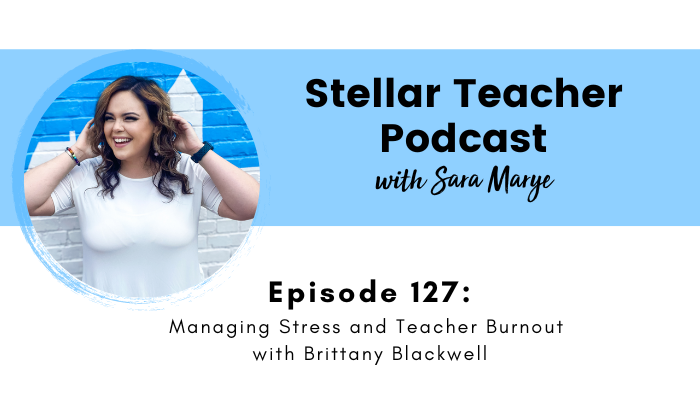
Click play below to hear how to manage stress and teacher burnout:
The topic of teacher burnout has been front and center in conversations for the last several years. And while you’ve probably heard other podcast episodes or read articles on the topic, I can guarantee you, this conversation is different. My guest Brittany Blackwell, who is a burnout and resilience coach, shares a new perspective on teacher burnout.
One of the biggest questions surrounding burnout is why is this happening and how can I fix it? Although Brittany would love to give you a straightforward answer, she says it’s not that simple. In all reality, there’s probably a long list of reasons why a teacher is feeling burnout, and not all are related to school. These stressors add up over time, which is why teacher burnout happens over time, rather than all at once.
Additionally, just like our students aren’t all the same, neither are teachers. So instead of a one-size-fits-all solution, Brittany suggests doing an individualized evaluation to best identify your triggers and how to develop healthy coping strategies. Likewise, Brittany emphasizes that in order to cope or manage burnout, internal work needs to be done first, not your environment.
This episode is an open conversation about the realities of teacher burnout, while sharing signs and stages, along with practical tips teachers can do. Brittany is an avid reader and researcher, in which she shares her knowledge and passion to help manage stress and empower teachers. This is an episode you don’t want to miss!
Meet Brittany
Brittany Blackwell
Brittany Blackwell, M.Ed. is an award-winning special educator and teacher resilience strategist from South Carolina with over ten years of experience working with elementary and middle school classrooms. Brittany is no stranger to teacher burnout and has a passion for empowering teachers and educational leaders to prioritize their mental health and develop individualized sustainable resilience plans to reduce stress, prevent burnout, and create the life, you’ve been dreaming about!
Brittany’s digital approach to self-care and resilience through digital planning, vision planning, and sustainable strategies has reached the homes of thousands of educators across the world. Also known as “MsPrincessTeach” on Tiktok, Brittany’s social media following grew through her fast-paced, lighthearted tutorials and humorous real life experiences.
Brittany helps teachers create their own Individualized Resilience Plan by providing sustainable strategies, personalized coaching, mindset shifting, and digital resources to reduce stress, automate the mundane tasks of teaching, and prevent overall teacher burnout. Her approach gives support so that educators can maximize fulfillment and effectiveness in their personal and professional lives.
In this episode on teacher burnout, we discuss:
- A simple analogy for why and how teachers are experiencing burnout at such a rapid rate
- Brittany shares signs that you might be feeling burnout
- Why internal work needs to be done before changing your external environment
- Signs and stages of burnout that are emotionally activated, which can create a physical response
- Brittany’s IEF (Individualized Educator Framework) for evaluating stress and burnout in your life
Related Resources:
- Check out the Stellar Teacher Reading Membership
- Brittany’s Work-Life Balance Audit
- The Ultimate Guide to Vision Planning for Educators
- Tune in to Brittany’s Podcast: The Resilient Teacher Podcast
- If you’re enjoying this podcast, please leave a review on Apple Podcasts!
Related episodes and blog posts:
- Episode 83, 5 Mindset Shifts Teachers Should Make Regarding Self Care with Alexis Shepard from the Afro Educator
- Episode 66, Teacher Burnout: Thinking Beyond Quick Fixes with Amber Harper
Connect with me:
- Join my newsletter
- Shop my TPT store here
- Instagram: @thestellarteachercompany
- Facebook: The Stellar Teacher Company
More About Stellar Teacher Podcast:
Welcome to the Stellar Teacher Podcast! We believe teaching literacy is a skill. It takes a lot of time, practice, and effort to be good at it. This podcast will show you how to level up your literacy instruction and make a massive impact with your students, all while having a little fun!
Your host, Sara Marye, is a literacy specialist passionate about helping elementary teachers around the world pass on their love of reading to their students. She has over a decade of experience working as a classroom teacher and school administrator. Sara has made it her mission to create high quality no-fluff resources and lesson ideas that are both meaningful and engaging for young readers.
Each week, Sara and her guests will share their knowledge, tips, and tricks so that you can feel confident in your ability to transform your students into life-long readers.
Tune in on your favorite podcast platform: Apple, Google, Amazon, Spotify, Stitcher, and more! If you’re loving this podcast, please rate, review, and follow!
Podcast (stellar-teacher-podcast): Play in new window | Download
Sara
Hey there, I’m Sara, host of the Stellar Teacher Podcast. And today you are in for a real treat. In today’s episode, I get to speak with Brittany Blackwell, who is the host of the Resilient Teacher Podcast. And she’s also the creator behind the really fun and light hearted Tik Toc account “MsPrincessTeach”.
Sara
Now Brittany is a special education teacher who is passionate about supporting teachers through burnout, and she also happens to be a burnout and resilience coach. Now, I know that teacher burnout has been a hot topic over these past few years. And you might be getting sick of hearing about it and talking about it. And I can pretty much guarantee that if you have experienced or are experiencing burnout, then you are definitely tired of living it.
Sara
Burnout is no joke, and it definitely is having a big impact on teachers. And while I’ve had other guests on this podcast in the past, who have shared some really great tips and strategies for self care and dealing with burnout, my conversation with Brittany felt very different from conversations I’ve had about burnout in the past.
Sara
Britney has helped many, many teachers, including herself go from teacher burnout to balance. And she does this by helping teachers create an individualized resilience plan, which she talks a little bit about in this episode. But during our conversation, Brittany explains how burnout happens slowly over time, and can creep up on teachers without them even being aware of it.
Sara
So if you suspect that you might be experiencing burnout, then this episode is definitely for you. Brittany walks us through the signs and stages of burnout. But then she also shares some really practical things that teachers can do to start to complete the stress cycle and begin healing from burnout.
Sara
Brittany is an absolute gem, and she has such a big heart for helping teachers. I really loved having this conversation with her and I hope you really enjoy listening to it as well. Let’s go ahead and jump into the conversation.
Sara
Hey, Brittany, welcome to the show. I am so excited to have you on as a guest today.
Brittany
I am so excited to be here. Thank you so much for having me.
Sara
Absolutely. So I love connecting with other teachers and especially other podcasters. In case my audience is not familiar with you yet, can you go ahead and give a brief introduction of who you are and what you do?
Brittany
Yeah. So my name is Brittany Blackwall, I am still in the classroom. I’m a special educator. I’ve been in education for 11 years. I am also a previous Special Education Coordinator, which I loved. But I returned back into the classroom after my first daughter was born because I was working way too much. And I needed to focus on my family.
Brittany
So my husband and I have five kids together. So I’m all about simplification, reducing overwhelm and any aspects because if I didn’t, I’d probably go crazy. But I dealt with some really like heavy burnout personally and professionally. I did some really extensive research about self care, you know, personal and professional growth, stress management.
Brittany
And really, as we entered into pandemic teaching, I started sharing tips and kind of navigating that virtual world on Tik Toc and just sharing that and what I noticed was that there were also so many educators who were struggling with teacher burnout and stress and just leaving the profession in droves.
Brittany
So I started shifting my focus to really teaching educators everything that I’ve researched over time about, you know, stress, burnout, simplification, boundaries, all that fun stuff that really isn’t discussed in teacher prep programs with my agency teaching mind, body and soul. And I began my podcast, the Resilient Teacher Podcast in summer of 2022, just to reach and support more educators.
Brittany
So now that’s what I do. I am a teacher resilience and retention strategist. And I help encourage and inspire overwhelmed teachers, leaders, schools and districts to really prioritize their mental health, individualize the resilience and burnout recovery so we can reduce that stress, prevent that burnout, create the life that we’re dreaming of, and really make a change in our broken system of education.
Sara
I love it. I’m just like, yes, yes, we need that. You know, it’s so interesting. We just recorded a podcast over for Brittany. So definitely go start listening to Britney’s the Resilient Teacher Podcast. But you know, we were talking about how, for me personally, at least when I, I’ve been in education for 17 some years, it’s been a minute. But you know, this idea of like burnout, I don’t remember teachers talking about burnout when I first started teaching.
Sara
I’m pretty sure I experienced burnout in my first year or two, but there wasn’t a name to it. And I feel like you know, even though there wasn’t a name for it, I feel like within the last couple of years, teacher burnout is front and center in conversation. And like you mentioned, you know, there are so many teachers who are leaving the profession, I feel like I read something last year where it’s like the average lifespan or not lifespan, and that’s the wrong term, but average career span of a teacher is like three to five years.
Sara
And I’m just like, oh, my gosh, when I first started teaching, and people were in the, you know, the career for 30 years, like 20 to 30 years. So it’s like, what is happening here? So, you know, from what you’ve researched and your experience, you know, why is it that you think so many teachers are experiencing burnout?
Brittany
You know, I don’t think it’s one specific thing that’s causing so many teachers to really struggle with burnout, I think it was a thing before, but no one was talking about it, you know. But I also think it’s a combination of factors. I think of it like a wastepaper basket, right?
Brittany
Like, each of us have these internal and external struggles that are like crumpled pieces of paper, right. And each of us has these different pieces that we throw into our basket. And at first, it’s just like a few. But over time, it’s like we don’t know or we don’t take the time to really flatten those pieces of paper and really process the struggles or manage that overwhelming stress, they just accumulate.
Brittany
And at some point, they just start to overflow, right. And because we’re in a career, where we’re giving our all to our students to help build them up, there isn’t really this emphasis on really taking care of ourselves.
Brittany
In our teacher courses in college, they never told us, Hey, by the way, you know, take care of you or even like how to choose appropriate methods to do so. Yeah, they never told us that we need to flatten out those pieces of paper, you know, so that the trash can doesn’t overflow.
Brittany
And I think that’s a big reason why there are so many teachers who are struggling with that burnout. We focus so much on our students social emotional development, but don’t really take into consideration the fact that it’s really a lifelong journey and our educators also really need that support with their own, you know, social emotional development.
Brittany
But I also think, you know, the pandemic left us in this long state of fight or flight, which really accumulates that stress within our bodies, and it’s just kind of a lot of teachers have these overwhelming wastepaper baskets, and they’re all in a line.
Sara
I love that simple analogy, because I think it is like one of those things where it’s like, Okay, you’re right. It’s not just one little thing it is, you know, a bunch of things sort of accumulating, it’s, you know, things that we haven’t dealt with, whether it’s things within our profession, things within our personal lives, things that are happening, you know, worldwide. And if we don’t take the time to process those, like all of those, like you said, crumpled up pieces of paper, they just start to accumulate.
Sara
That’s a good reminder that we like need to take care of ourselves. Yes. How can a teacher even tell them if they are burned out? I feel like this is one of those things that it’s like, it’s out there. Like, I feel like teacher burnout, but you know, I’m sure there’s some teachers who are listening, they’re like, wait a minute, am I burned out? Am I not burned out? Like, should I be burned out? You know, how can I tell? So like, how can a teacher even tell if they are experiencing burnout?
Brittany
Yeah, so research finds that certain personality traits, like being a type A, achiever, can you really contribute to burnout, and many teachers often fit that mold. I am a recovering, perfectionist. And so that is something that really is one of those contributing factors.
Brittany
But burnout is really, it’s an insidious condition, it happens like slowly over a period of time, so you may not even realize it’s happening. The consequences, though, can really be life altering. So it’s really important to kind of spot those signs early, being self aware, and recognizing, hey, you know, I’m starting to feel stressed more frequently, there’s a whole cycle of stress that really leads to burnout.
Brittany
But a lot of signs and symptoms are like emotionally activated. So when we feel those emotions, it doesn’t ultimately mean that we’re burned out. But having those symptoms for a longer period of time does indicate that it can be burnout, and can lead to those more serious conditions physically, emotionally, mentally, spiritually.
Brittany
So every year, you know, teachers struggle with that burnout, it doesn’t mean you know that you’re burned out you’re not resilient, right? Like it means that you are really strong to really be performing in unfavorable conditions. So some of the simple signs are feeling overwhelmed or depleted, not enjoying the things that you use to poor nutrition or sleep, unmotivated, lethargic, relying on unhealthy coping mechanisms, trouble focusing, these are all like the earlier state edges of burnout.
Brittany
When we get to later stages of burnout, you’re having these more serious symptoms where you can’t get up out of bed, you’re more depressed, that more chronic stress. But the thing is, once you’re an active burnout, it’s really hard to pull yourself out. You just keep kind of going through those stages.
Brittany
And I recognize like how important it is how little emphasis is really given in teacher training on combating burnout. So like, if you’re here, you’re like, Yes, I’m in active burnout. I’m here to tell you, it’s really not too late. There is a way to go from burnout to more balanced, similar to anything else recognition and awareness is really one of those first steps to really preventing it.
Sara
I was gonna say, I mean, it’s like those those things that you mentioned, I’m like, Yep, I’ve experienced that. I know, teachers who have experienced that, I observed teachers experiencing that, you know, when I was an assistant principal, but hearing you say it, I’m like, these are scary things, right? Like, these are not things and not to be like, Okay, we need to be worried about this.
Sara
But like, these are serious things that I think we need to like, take seriously, it’s like we’re talking about somebody’s like, physical health that, like, if we don’t address these, then like, there could be some like, you know, much larger like consequences. And I just, I hate the idea of a teacher getting to a place where they’re so unhealthy because of something that’s happening in their career.
Sara
So first of all, I love that you are helping teachers with the issue of burnout. But I’m just like, oh my gosh, we need to give more support for teachers so it doesn’t get to that point of active burnout.
Brittany
Absolutely. And you know, you know, stress, the whole idea of stress, it’s a cycle that keeps happening over and over. And as teachers, we get stuck in this stress cycle that really leads to burnout. And like the wastepaper basket that I was talking about, it accumulates within your body, that stress.
Brittany
There’s a book called The Body Keeps the Score by Bessel Vander Kolk. And it talks about how stress trauma, things like that gets stuck in the body. And that’s what kind of causes some of those physical symptoms that can really, you know, it that is a scary thing. And that’s why it needs to be talked about.
Sara
Okay, so let’s talk about some practical things that teachers can do. You know, so I know that you talk a lot about burnout and supporting teachers, what are some tips that you have to help teachers prevent or combat burnout, you know, while still remaining in the classroom.
Sara
Because another thing is, I feel like a lot of the conversation is like, leave the classroom, right? Like, if you’re burned out, you can’t there’s no way that you can make it work. But I know that there are teachers who can sort of recover from burnout and continue teaching, because again, it’s like so many teachers become educators, because they love what they do. They love working with kids, and they don’t, they don’t want to continue in this phase of burnout.
Sara
But that doesn’t mean that they want to leave this profession that they once love. So what do you got for us?
Brittany
So first off, before I give you the tips, I want to say this, leaving a profession is not going to get you out of burnout. Because the I know, that’s a really hard thing to grasp. Because I think a lot of teachers think, Oh, well, if I just leave that it’ll, it’ll make it better.
Brittany
What I mentioned before about these different personality types is that those are patterns that we’ve accumulated over time, that’s those are things that we do regardless of if we’re a teacher, we’re if we’re a mom, if we are a, you know, a parent, or you know, we get into something, we will still have those patterns that happen over time.
Brittany
So if we leave the profession and go to another profession, we’re still going to have those personality traits that really lead to burnout. So that’s not necessarily going to get you out of burnout.
Brittany
But I did create my signature framework for burnout, recovery, and resilience. And I call it the individualized educator framework. I’m special educator makes sense. But I believe that every teacher is unique, we have these strengths, these weaknesses, these preferences, so giving these one size fits all strategies or tips, things like that really aren’t going to help support teachers.
Brittany
So the first step in the educator framework is evaluation. And I’m not going to go into every step here. But the first thing I want to recommend that we do is really discover our why or our triggers for the stress cycle. So this means just taking 15 minutes and making a list of all the things this year or this semester or even this month or this week, that stressed you out like was it a specific class or a task? Was it a specific person, maybe a co worker.
Brittany
Think about the things that are really stressing you out and consider it, you know, for the coming school year, the next coming school year, like what are these things? And don’t just limit it to school situations. Because oftentimes, our out of work experiences can really impact our burnout at work as well. But add any like specific emotions to the list and you can categorize them into similar situations.
Brittany
But the purpose is really to make yourself aware of all these things that they may have, you know, that you may have previously or you anticipate to cause you to not endure stress cycle and rather perpetuate it right.
Brittany
So once we know one of those root causes, which I’m going to be honest here, there may be you know, many we can begin to look deeper into the actions that we can take to really mitigate that stress from those specific causes.
Brittany
And then the second step is to really develop healthy coping mechanisms. So it’s really important to have these on hand to really manage that stress to really prevent that burnout. And I don’t like any of them either, honestly.
Brittany
But it’s like exercise, meditation, that deep breathing or other really activities that really help you relax, get into that parasympathetic nervous system and reduce stress levels. So all of those things that really set up our bodies to be able to appropriately process that stress that is really negatively impacting us.
Brittany
And you know, like about the wastepaper basket. These are those coping skills that are really just like regular trash day, like we’re dumping it out. We’re, we’re removing those stressors, so it doesn’t really overflow.
Brittany
And then the third thing is to really look back on that evaluation or that recognition of your triggers and start setting those boundaries. Setting boundaries is super important for preventing burnout and maintaining that healthy work life. I don’t like the word balance, I like alignment.
Sara
Oh, I do like that better.
Brittany
Yes. So this could be like setting limits for work hours, delegating tasks, saying no to unnecessary commitments, you know. And I talk about this more in depth in my programs, my workshops, and my podcast as well. But when it comes to really preventing burnout, while still in the classroom, I’m going to tell you completely honest, that just telling yourself that everything’s gonna be okay, is not going to cut it.
Brittany
Like I’ve always hated it when people say, Well, just don’t think that, you know, just remind yourself, it’s gonna be okay. You know, there’s a reason that that doesn’t work. And the fact is that completing the stress cycle, or, you know, beating burnout, it’s not an intellectual decision.
Brittany
There’s a book called Burnout: The Key to Unlocking the Stress Cycle by the Nagoski sisters, and they say like, it’s a physiological shift. It’s like, we don’t have to tell our lungs to keep breathing or stomach to digest food. Even if we did, like, our body is going to do what it wants to do.
Brittany
So you can’t complete the stress cycle, or you can’t get out of burnout, just through deliberate choice. Like you have to give your body what it needs to complete the physiological responses that it was meant to do.
Sara
That is so fascinating. And I’m so interested in these types of things. I’ve heard of the book, but I’ve not read it. So I’m gonna like go at it to my Amazon cart after this. Yes, but I wanted to just back up to, you know, when you said leaving the profession is not going to solve your burnout.
Sara
And I mean, I can kind of personally attest to, that’d be like, Yep, I for sure can you know, firsthand when I left teaching or not teaching, but when I left working in a school, my last three years, I worked as an assistant principal. And I definitely got to a point of burnout in that specific role, where all of those things that you mentioned, I wasn’t enjoying what I was doing, I didn’t have you know, the energy or the enthusiasm, and it just was not fulfilling, it was very stressful.
Sara
And, you know, part of me, I, you know, took some steps to resolve that. But in my head, initially, I was like, you know, what, if I just change my environment, and change my profession, then I won’t have to worry about, you know, burnout anymore. And that’s when I made the decision to leave and start my own business. And everything was great for a while. But guess what, you know, come 2019 2020, I definitely went through another season of burnout again.
Sara
And I was almost shocked by it. So I was like, wait a minute, I’m not in the classroom, like, I shouldn’t be burnt out. But I was like, this was not ever about the environment that I was in it was my response to it. And then I had to dig in and figure out because I was like, Okay, if this burnout can happen to me when I’m working from home with a lot of flexibility, and not the same stressors, but I still got to that place of burnout, I was like, I need to deal with it on an internal level.
Sara
Because there’s going to be more, there’s gonna be more life stress that gets thrown my way. You know, it’s just, it’s part of it. And so yeah, I think we can we can think that there’s these Band Aid fixes, but the reality is, is it’s very much this internal work. Yeah.
Sara
I know that you had mentioned that, you know, the very first thing that we want teachers to do is to evaluate and really sort of like take an outward perspective on all of the stressors. So the personal stress, the work stress, like what are all of the things that are causing the stress?
Sara
You know, what suggestions do you have for a teacher that looks at that list, and it is massive. You know, they are stressed out by their work demands, by their principal, by their co workers, by their students, by parent relationships. They’ve got, you know, personal stress at home, they’ve got, you know, money stress, they’ve got health stress, they’ve got, you know, family stress, and almost just like looking at that list like that can even be an accumulator of stress.
Sara
So, like, where do teachers begin that they feel like okay, I’ve evaluated this and I realized I’ve got a lot of areas of stress in my life, and I want to start working on resolving those. How do they get started with trying to make some positive steps?
Brittany
So I think the first thing that you can do is I have this free 10 minute training It’s free, it’s 10 minutes. But it’s really about how to audit your work life balance, but it talks about these different stressors and how to really parse them out to see which ones you actually can control and which ones you can’t, and how to really parse that out so you can see that.
Brittany
So I’m going to give you that. But it’s, it’s basically where you make this web. And you can see which things are draining your energy and which ones are energizing you. And if you’re having all of these things that are draining your energy all at one time, then you’re not putting enough back into you, you’re not putting enough energizing things on your list of things to do to really give yourself what you need in order to be successful.
Brittany
So I will give you that link so that you can put that in the show notes. But it’s super helpful just to be able to visualize it, but then also to realize, hey, like, I’m really not doing a whole lot to put back into myself, I’m giving all of these things out and about.
Brittany
And so really, if you’re overwhelmed, if you’re dealing with all of these different stressors, you need to be able to balance that out with things that are replenishing that energy. So it’s not all sucking it out of you.
Sara
I love that. And I mean, as I’m sort of like thinking through even just this like web and you know, categorizing things, and things, seeing things how they link, but I love that idea of like, okay, what is going out has to then be compensated by, you know, like, we need to put something in that is like fueling us. I feel like you’re so good at just like creating analogies or visuals to help us figure out this really difficult topic.
Brittany
Yes, no. And because I dealt with it, and nobody could explain it to me, nobody, nobody could tell me, you know, why do I feel this way? Like, why, why was I so burned out? And why was I dealing with all of these things?
Brittany
So I read constantly, I am a huge avid reader, like I will read six books all at one time. And then I compile all the information and synthesize it. And so when I realized, you know, people weren’t explaining things I’m like, okay, so this person explained it this way. And it sounds really good. But how do you, that doesn’t really make sense. So that’s awesome.
Sara
Well, this has been such a great conversation. I’m so excited to share this conversation with my audience. And I feel like it’s kind of been a heavy conversation, because burnouts, maybe not the most fun thing to talk about. So do you mind if we end our conversation with a few really fun light hearted hot seat questions?
Brittany
Sure, go for it!
Sara
Okay, so what is your favorite book, movie or TV show that you have binged this last year?
Brittany
So I’m really not a TV show person. Honestly, like, I don’t really watch TV. I say that, but then I like binge an entire season of something. So really, my top two favorite TV shows right now are Manifest, my husband and I we totally binged that in two weeks, all of the seasons. And then recently, it’s Wednesday.
Sara
I’ve seen Wednesday on Netflix, but I haven’t watched it yet.
Brittany
But it’s really I like it, it’s really good.
Sara
I was gonna say I haven’t watched Manifest, I’m gonna have to add those two to my list. What is one place that you want to travel in the next 10 years?
Brittany
Greece. So I’m a pretty big traveler, I have been to a bunch of different places before I had kids. And the only place that I have not been is Greece and Santorini just just to be able to see those blue tops and the white buildings and the beaches and stuff like that. That is like my dream vacay.
Sara
That’s on my list too of places to go. Okay, what is your favorite PD book, blog or podcast that you love to recommend to teachers?
Brittany
So my favorite book is Onward: Cultivating Emotional Resilience and Educators by Elena Aguilar. It’s a really good book because it’s talking about emotional resilience for educators. But a lot of the things in the book are things that you can incorporate with your classroom as well. And that is a huge thing that I think needs to be happening with our kids right now too.
Sara
Yeah, I love that. It’s like helpful for teachers but then also helpful for students as well. Okay, last question. Favorite children’s book?
Brittany
Favorite children’s book is Rainbow Fish. Classic. Rainbow Fish was a people pleaser bless his heart.
Sara
Bless his heart. Yeah, probably that wasn’t burnout on his.
Brittany
Yeah, just burnt out from giving everything to everyone else.
Sara
Well, Brittany, again, thank you so much for coming on the show today. I just love the work that you’re doing and how you’re supporting and encouraging teachers to become, you know, more resilient and just healthier individuals. Where can my audience find you online in case they want to connect with you after this conversation?
Brittany
Absolutely. So I love connecting with other educators, especially those who are overwhelmed looking for ways to break that cycle of burnout really reignite their passion for teaching. So if listeners want to learn more from me, you can find me on Instagram at @teachingmindbodyandsoul or on Tik Tok. I’m way more popular and I talk a whole lot more on Tik Toc but at MsPrincessTeach.
Brittany
But I also have a podcast the Resilient Teacher Podcast and I really wanted to change the narrative around resiliency because I was so used to that being a term that was used to gaslight teachers into not recognizing what was wrong with our system. So I can’t tell you how many times like I heard, you need to be resilient in some crappy situations.
Brittany
But the goal of the podcast is to really remind teachers that they are resilient, lead them to making the change that we need to see in the system of education because it’s broken.
Brittany
And the podcast is for overwhelmed educators who want to get that support, the tools, the mindset to reduce teacher burnout, keep teaching sustainable, and I carefully really create those episodes to inspire teachers to individualize burnout, recovery, self care, resilience, as well as learn to prioritize their well being and mental health all while making a bigger impact in their classrooms and community.
Brittany
So I have a new episode that goes live every Tuesday and I would love to have more listeners come in, check that out. But if there are teachers out there who are struggling with stress, burnout, just overall, you know, sustaining their career and education, DM me, come hang out with me, because like seriously, like, I want to chat about burnout, their journeys, all of that good stuff.
Sara
That’s awesome. We will definitely link to all of those in our show notes, and be sure to go check out Brittany’s podcast. It’s phenomenal. And like I said, Thank you so much for coming on and having this conversation today.
Brittany
Yes, thank you so much, Sara. It was great.


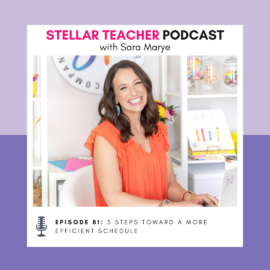
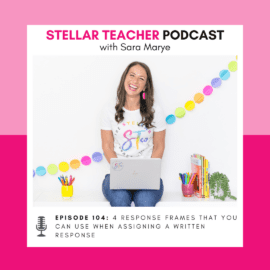
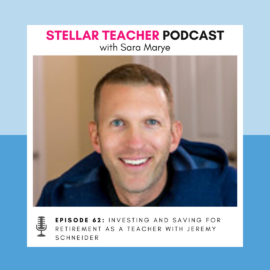
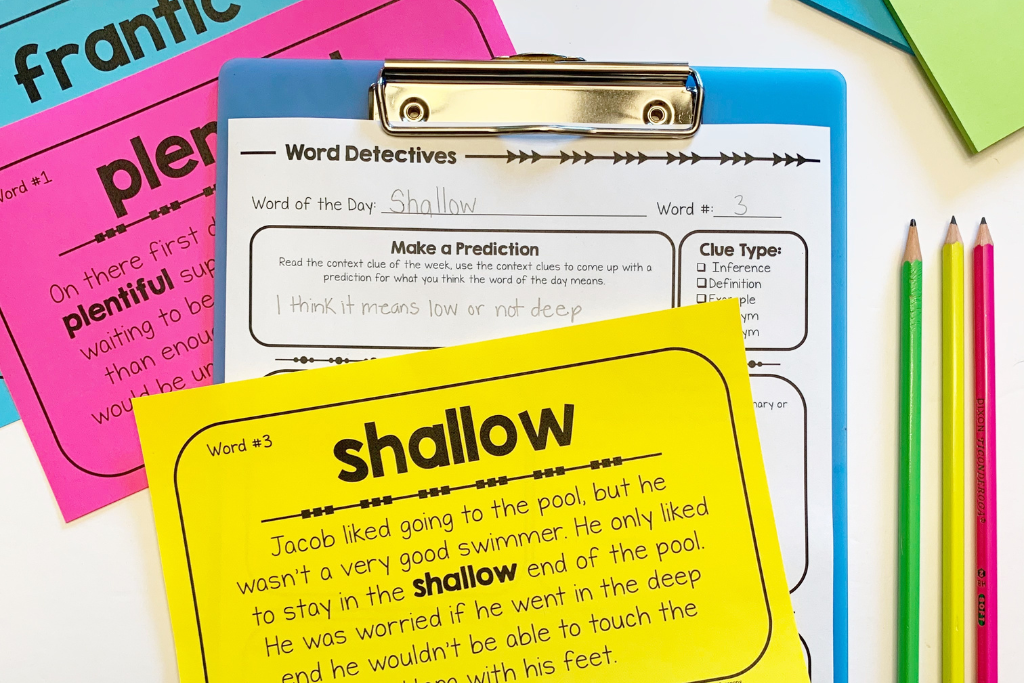

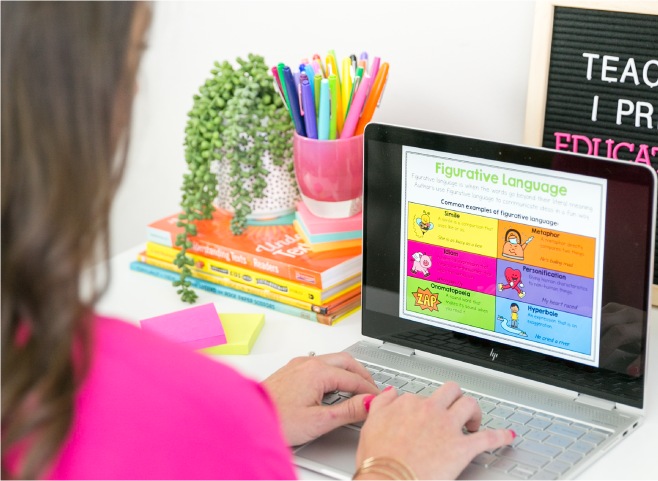
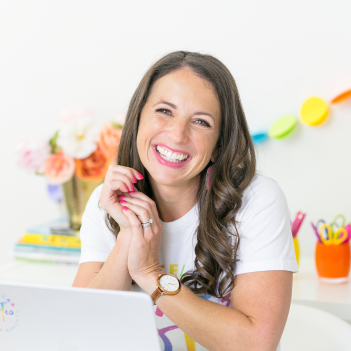
Leave a Comment
You must be logged in to post a comment.